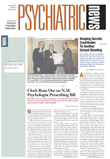“You are the eyes and ears for CMHS,” Bernard S. Arons, M.D., director of the Center for Mental Health Services (CMHS), told members of the center’s new National Advisory Council subcommittee that is composed of individuals who identify themselves as consumers of mental health services.
The subcommittee, which first met last fall and again in January, came about as part of the CMHS’s efforts to provide consumers of mental health services a greater voice in shaping the policies that affect them. That initiative got under way about five years ago when Paolo del Vecchio was hired as the CMHS’s first consumer-affairs specialist.
(The term consumer has certain implications different from the term patient or former patient. According to the National Mental Health Consumers' Self-Help Clearinghouse, the mental health consumer movement is a growing movement of people calling themselves consumers, survivors, or ex-patients who are working to make changes in the mental health system and in society. The movement emphasizes advocacy, mutual support, and self-help groups. The term consumer is used throughout this article to distinguish between traditional patient roles and consumer roles that emphasize advocacy and self-help. It is the term used by those interviewed for this story. Consumers may or may not be patients in a traditional sense.)
Del Vecchio worked to strengthen the role of consumers on state advisory councils; develop dialogues between psychiatrists, mental health professionals, and consumers; host regional meetings to receive consumer recommendations for the U.S. Surgeon General’s Report on Mental Health; and provide grants for consumer-operated programs. Del Vecchio soon realized, however, that a permanent formal mechanism for securing consumer views was necessary and advocated successfully for a subcommittee of consumers to the National Advisory Council.
Subcommittee member Sylvia Caras, Ph.D., said, “It was very important that consumers determined the process by which selections for the subcommittee were made. From the beginning, CMHS modeled its commitment to consumer involvement.”
To develop the selection process, Frank Burgmann, a former consumer representative on the National Advisory Council, chaired a planning group made up of representatives of consumer organizations. “In addition to a geographic and demographic mix, we wanted people who could network successfully at the grass-roots level and bring a wide variety of opinions to the table,” he said at the meeting.
Nine members were selected from more than 100 applicants. The members include the holder of a doctorate in sociology with postdoctoral training in health services and policy; the founder of PeopleWhoNet, a pioneering Internet site; an advocate concerning ECT issues; a specialist on cultural competence and Asian-American issues; a lawyer and advocate concerning custody issues for parents with psychiatric diagnoses; and other leaders in the consumer movement.
The subcommittee is charged with identifying emerging mental health issues that matter to consumers, such as new legislation concerning involuntary treatment; reporting on what states and communities are doing to involve consumers in the mental health system; and helping brainstorm solutions to problems.
Subcommittee member Caroline Kaufmann, Ph.D., said, “The subcommittee’s very existence is an accomplishment. It is unusual, historically, to ask people with mental illness to participate in policy discussions at a national level. The experience of [the group] brought to bear on federal mental health policy can broaden federal concepts of mental illness and provide a human face to service development.”
Said Subcommittee Chair Russell Pierce, “The subcommittee is the first effort to bring consumers to the table in an organized way. It shows that the consumer movement is respectable.” At the subcommittee’s first meeting, members came up with a list of more than 25 items that merit further attention (
see box on page 15).
Subcommittee member Jon Brock spoke in support of developing a “consumer/survivor wing” for the mental health professions by providing fellowships or grants for consumers to get further education or training in the mental health field. In a later telephone interview, he explained, “The federal government already has programs that encourage specific groups to get education for various professions. It is just as legitimate to fund further education for consumers that will build on their experience. The movement is at a stage where it would be enormously helpful if people in leadership roles and others had an opportunity to develop their skills.”
Francis O. Lu, M.D., a clinical professor of psychiatry at San Francisco General Hospital and a member of the National Advisory Council, lauded the subcommittee’s formation. The subcommittee “is a positive development that everyone welcomes.”
Another council member, Karina K. Uldall, M.D., an assistant professor of psychiatry and behavioral sciences at the University of Washington, said, “There is something synergistic that occurs when you bring providers and consumers together as equal partners in care. Each group learns from the other, and services improve in ways that neither group could accomplish alone.”
In fact, the National Advisory Council unanimously accepted the subcommittee’s three recommendations presented at the September meeting:
• Support the use of “people first” language within mental health research, policies, programs, and professions.
• Endorse the use of the phrase “discrimination and stigma” rather than “stigma” alone. Use of the word “stigma” furthers the isolation and exclusion of people who experience mental illness by creating a special vocabulary.
• Encourage research on the value of the consumer/survivor movement as a resource for recovery and resilience among people who use public mental health services and engage consumer/survivors in development of that research.
Caras said, “Finally the push for consumer involvement in health policymaking has come to mental health.” ▪
